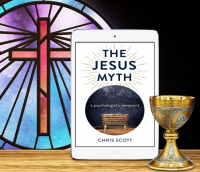


Without God, there would be no morality and no meaning. Is that true? It is, if we understand God as the symbol for the fact that there are important things that are beyond one’s control, but not if we understand God according to a literal interpretation of how He is represented in the Bible.
It is easy to see that if nothing were under my control, then my actions would be neither moral nor immoral. We don’t praise or blame someone for something that is completely beyond his or her control. Properly speaking, if nothing were under my control, then there would be no such thing as an action of mine. Even movements of my body, in such a case, would be things that happen to me rather than things that I do. I wouldn’t even exist as an agent. I couldn’t even wish that things were different, or, instead, decide to accept my fate, since that would require a control over my attitude, and we are supposing I have control over nothing. Clearly, such an existence would be not only one in which I had ceased to be a moral agent, but also one in which I had ceased to have a meaningful human existence.
If we consider the opposite extreme, where everything would be under my control, then the only moral question and the only question that could give any meaning to such an existence would be whether or not I would choose to relinquish some of that control, so that some other agent could exist. Other than that, with no possible frustration of my desires and with no other agents whose interests I could aid or harm, my existence would be just as amoral and meaningless as the one in which I had control over nothing.
It follows that if there is to be morality and meaning in my life, it must be the case that I am in control of some things but that there are also important things beyond my control. Is there another necessary condition for morality and meaning, namely, the existence of an all-powerful god who is either an unidentified part of the physical universe or else a non-physical being who can create and annihilate physical things, change the laws of nature, and become a physical being at will? Some people think the existence of God in this sense is necessary to account for the objectivity of morality and for the meaningfulness of our lives.23 There is a flaw in this thinking, however, which Plato recognized and expressed in the dialogue Euthyphro. If the authority of morality derives from God, is God Himself bound by it? Surely, we want to answer Yes, since God is merciful and just, and an immoral god would not be the true God. However, if morality has no reality independently of God’s creation of it, if it depends entirely on His will in creating it, then He could change it any time He pleases, just as He can change the physical laws, either momentarily or permanently. This in turn implies that God is not necessarily merciful and just, since He could have made it immoral to be merciful and just and still could do so at any time He wishes. In fact, if this view of God’s powers in relation to morality is correct, there is nothing that we think we know is morally wrong that God could not demand of us by decreeing it the moral thing to do. He could decree that it is moral to torture babies, and it would be so. It will do no good to protest that God simply wouldn’t do that, because He is good; since on this view His will alone is what makes something good. The only solution is to reject this view as morally repugnant. God is not a tyrant
who creates morality arbitrarily by fiat. Something isn’t morally good or morally evil just because God says so. Rather, He says so because it is so. This implies that morality is conceptually independent of a literal creator God. That is the only way in which it makes sense to praise God as a good, merciful, and just God.
The whole point of thinking of God as the creator of morality was to explain why morality is not just subjective and arbitrary; and yet if we accept the literalist view, then it is subjective and arbitrary. Do we agree that morality is not just subjective and arbitrary? We should. If one reflects for a moment on one’s thinking, on any occasion in which one complained that something was unfair, it becomes obvious that one would not be willing to accept, as a defense of that action, the reply, ‘You’re wrong that it was unfair because from my subjective point of view, it was fair, and morality is just whatever I say it is.’ The thought was that if we could agree that morality isn’t determined by what I say it is or by what you say it is, but only by what God says it is, then we would have an objective way of settling moral controversies. Since we have seen a flaw in this thinking, namely that God is morally praiseworthy only if He does not create morality by fiat, then we either have to come up with some other way of explaining the objectivity of morality; or give up and admit that we don’t understand it, although we still believe it is objective; or conclude that it is purely subjective and so every- thing is permitted.
It will do no good to suppose that society, or any other kind of individual or collective authority, determines morality, because the same argument applies against this new supposed authority that applies against taking God to determine morality by fiat. Either society (or - insert the name of any other proposed authority) simply declares something to be morally acceptable (or unacceptable) and thereby makes it so, or else society recognizes that some things are morally good and others morally bad and declares them to be so because they are. On the first alternative, society is morally good only by definition and not in any independently meaningful sense. Society could even declare that practices that lead to its own destruction are morally good, and on the theory that society is the moral authority, those practices would be good. On the second alternative, society makes its judgments by recognizing some universal standard of morality, and if it does so correctly, we have good reason to follow its advice; but in order to know whether society’s standards really are morally correct, we need to understand what makes something moral, or immoral.
Well, then, what does make something moral, or immoral? Moral
actions are those that give us all a good reason to have less anxiety about
meaninglessness, and less fear of suffering, of dying, of going crazy, of being
unloved and unlovable; while immoral actions are those that have the effect of
increasing that anxiety or those fears. There is, then, an intimate connection
between the true religion and morality. Moral actions are the ones that make
salvation, i.e., the realization that everything is funda- mentally all right,
more likely; while immoral actions are the ones that make it less likely. But
it isn’t that the true religion creates morality, in the false way it is
sometimes supposed that God creates morality; for if that were true, then the
true religion could have made it so that actions that make salvation less
likely would be the moral ones. Any religion that promotes a morality that
leads to more anxiety about meaninglessness, or more fear of suffering, of
dying, of going crazy, of being unloved and unlovable, is a false religion. So,
religion is just as dependent on morality as morality is on religion. This
doesn’t imply that people who profess some other religious views or none at all
are incapable of acting morally. Rather, it implies that when they do, they are
practicing the true religion just as much as anyone ever does.
BUY NOW
Categories:
0 comments on this article







